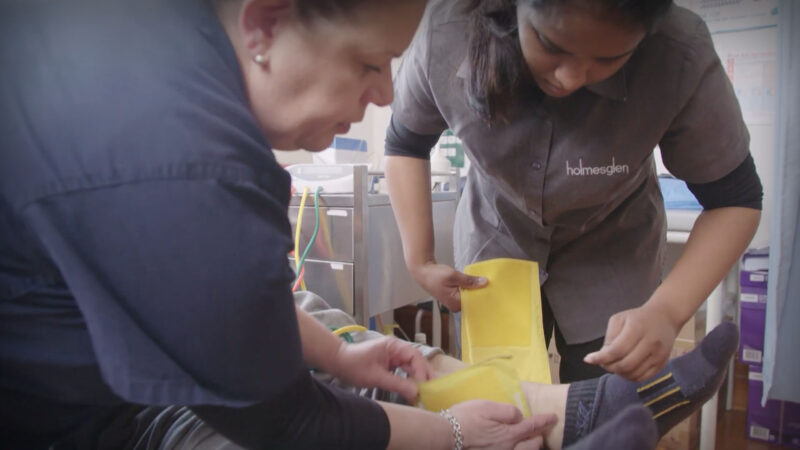Australian entrepreneur, Lauren Barber, turned her nursing background into the role of an inventor and launched a medical device into the Australian healthcare industry.
Lauren began her career as a nurse at the Sydney Adventist Hospital and later moved into cosmetic dermatology, leading her to start her own company. Her journey as an entrepreneur has been challenging, but she has learned skills in resilience and crisis management. She still works as a nurse for 1-2 days a week to maintain her clinical skills. Her inspiration for this career path stems from a personal experience with a needle stick injury that led her to explore the relationship between needle-phobia and a person’s health.
NeedleCalm has now launched a new, world-leading medical device in Australia to improve vaccination rates and calm the nerves of the approximately six million Australians who fear injections. The Class 1 medical device, which recently received approval from the TGA, works by using a technique referred to as “closing the gate” between the needle injection site and pain receptors in the brain.
“Our technology is a game-changer and can be used in an estimated 76 million needle procedures in Australia each year. It’s easy to dismiss needle phobias, but they affect approximately 25% of Australians, while a local study found one in five patients with a fear of needles reported avoiding healthcare.”, says Lauren.
And today in Adelaide at the Australian College of Nursing’s National Nursing Forum, Lauren Barber was awarded the winner of the Health Minister’s Award for Nursing Trailblazers. The award acknowledges nurse-led innovations and models of care which significantly improve health outcomes for the Australian community through evidence-based processes.
With the support of her family and over 10 mentors who specialise in various areas, Lauren has overcome struggles in finance and fundraising. She has learned from her mistakes and now seeks advice from multiple sources before making a decision. In this reflection segment with Australian Health Journal, Lauren talks about the challenges of bringing a medical device to market, not just in company formation, regulatory approvals but also in selling to the health care procurement departments in hospitals.
No journey is linear for an entrepreneur, but Lauren has travelled considerable distance from a nursing student to a successful entrepreneur illustration her determination and passion to help those with needle phobias. Lauren’s work with NeedleCalm is making a positive impact in the healthcare industry and improving the experiences of patients and clinicians alike.
Adapted from Charles Sturt article “Lauren launches world-leading medical device to improve healthcare access”
You Might also like
-
Cardiovascular Disease Risk Guidance and Calculator get long overdue update
Cardiovascular disease (CVD) is responsible for significant morbidity and premature mortality in Australia. Ischaemic heart disease was the leading cause of death in 2020 and cerebrovascular disease was the third most common cause of death.
As the first major update to Australian CVD risk assessment guidelines in over a decade, the 2023 Australian Guideline for assessing and managing cardiovascular disease risk and associated Aus CVD Risk Calculator reflect the latest evidence on assessing, communicating, and managing CVD risk. Developed using Australian-specific data and the latest evidence, it supersedes the 2012 Guidelines for the management of absolute cardiovascular disease risk.
-
Message from former Australian Health Minister Hon Greg Hunt
The Honourable Greg Hunt served in the Australian Government as Minster for Health and Aged Care from 2017, previously as Industry, Innovation and Science Minister and before that the Environment Minister.
Elected as the Member for Flinders in 2001, Greg announced his retirement from politics late 2021 and in 2022, ahead of the Federal Election, having completed 20 years as a public servant.
Australian Health Journal recently caught up with Greg in a relaxed interview at his home in the Mornington Peninsula, Victoria to hear how a 9 month sabbatical has allowed him to focus on family, fitness and future. This has even included some “brutal spin cycle classes!”.
-
Student nurse placements in primary health care
With an urgent need to manage increasing rates of chronic disease, an ageing population, and a rapidly-ageing primary health care nurse workforce, Australia desperately needs more primary health care nurses to enter the workforce before the current generation retires and cannot pass on its skills.
Most nurses start their career in a hospital. Historically, it was difficult for universities and tertiary education providers to arrange placements for student nurses in primary health care. However, the APNA Student Nurse Placement Program provides student nurses with a foot in the door to a career in vibrant primary health care settings such as general practice or community health to perform supervised activities.



